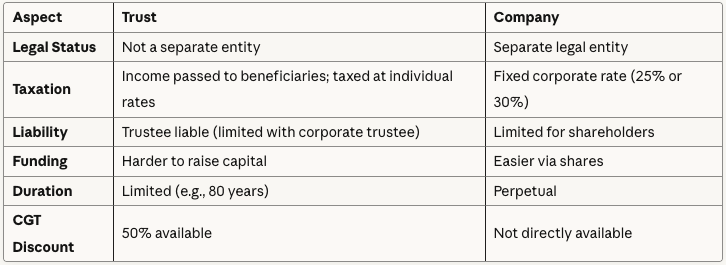
Published: October 2025
When starting or restructuring a business in Australia, selecting the right legal structure is crucial. It affects taxation, liability, asset protection, and growth potential. Two common options are trusts and companies. This article explores the key differences, advantages, and disadvantages to help you decide. Remember, every business is unique, so professional advice is essential.
Your choice of structure influences how income is taxed, how assets are protected, and how easily you can raise capital. For instance, trusts often provide flexibility in distributing income, while companies offer a more formal framework suitable for expansion. According to the Australian Taxation Office (ATO), the structure must align with your business goals, and changes can involve costs like stamp duty or capital gains tax.
A company is a separate legal entity under the Corporations Act 2001, registered with the Australian Securities and Investments Commission (ASIC). It can own property, enter contracts, and incur debts independently of its owners. Ownership is through shares, and management is typically handled by directors.
A trust is not a separate legal entity but an arrangement where a trustee holds assets for beneficiaries, governed by a trust deed. Common types include discretionary trusts (flexible distributions) and unit trusts (fixed units like shares). Trusts are popular for family businesses and must distribute income annually.
To compare, consider these aspects:

Trusts suit businesses focused on tax minimisation and family involvement, while companies are ideal for scaling and external investment.
Decide based on your needs: opt for a trust if flexibility and protection are priorities, or a company for stability and growth. Review your structure regularly, as business changes may warrant a switch. Always seek expert guidance to navigate ATO rules and avoid pitfalls like family trust elections or public trading trust issues.
What is the main difference between a trust and a company in Australia?
A trust is an arrangement where a trustee holds assets for beneficiaries, offering tax flexibility but no separate legal status. A company is a distinct legal entity with limited liability for owners, suitable for growth and investment.
When should I choose a trust for my business structure?
Choose a trust if you prioritise income splitting for tax savings, asset protection, and privacy, especially for family-run businesses or those with variable income distributions.
What are the tax advantages of a company over a trust?
Companies benefit from a flat tax rate of 25% or 30%, allowing profits to be retained and reinvested at lower rates, whereas trusts distribute income annually, taxed at beneficiaries' individual rates.
Can I change from a trust to a company later?
Yes, but it may trigger capital gains tax, stamp duty, or other costs. Consult a professional to assess the implications for your specific situation.
Is a trust or company better for asset protection in Australia?
Trusts often provide stronger asset protection as beneficiaries do not directly own assets, but using a corporate trustee can limit liability. Companies offer limited liability for shareholders but require careful management to avoid personal guarantees.
How much does it cost to set up a trust or company?
Setup costs vary: companies start from around $500 for ASIC registration plus legal fees, while trusts involve drafting a deed (often $1,000-$2,000). Ongoing compliance adds annual expenses.
Scale Suite delivers embedded finance and human resource services for ambitious Australian businesses.Our Sydney-based team integrates with your daily operations through a shared platform, working like part of your internal staff but with senior-level expertise. From complete bookkeeping to strategic CFO insights, we deliver better outcomes than a single hire - without the recruitment risk, training time, or full-time salary commitment.
Considering building an internal finance team?
We'll show you exactly what our three-tier model covers, how it compares to internal hires, and what it would cost for your business.
We'll reply within 24 hours to book your free 30-minute call.
No lock-in contracts and 30-day money-back guarantee.
Prefer to book directly? Schedule your free 30-minute call here



